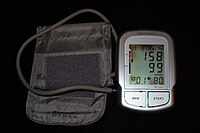
Photo from wikipedia
Purpose This study aimed to investigate the effects of resistance exercise (RE) on autonomic control and blood pressure (BP) reactivity during mental stress (MS) in treated older hypertensive women. Methods… Click to show full abstract
Purpose This study aimed to investigate the effects of resistance exercise (RE) on autonomic control and blood pressure (BP) reactivity during mental stress (MS) in treated older hypertensive women. Methods Ten older hypertensive women (age =71.1±5.5 years; body mass index =24.2±3.9; mean BP [MBP] =85.4±3.5) underwent a protocol consisting of BP and heart rate variability (HRV) output assessments at baseline and during MS, and these measurements were taken before and 60 minutes after two bouts of RE (traditional and circuit). MS was induced through a computerized 3-minute Stroop color–word test before and 1 hour after each exercise session; BP was measured every minute during MS, and HRV was monitored as a measure of cardiac autonomic control. Results A significant effect of time on systolic BP (Δpre =17.4±12.8 versus Δpost =12.5±9.6; P=0.01), diastolic BP (Δpre =13.7±7.1 versus Δpost =8.8±4.5; P=0.01), and MBP (Δpre =14.0±7.7 versus Δpost =9.3±5.4; P<0.01) after RE was observed, with no differences between the two sessions. In addition, a significant effect of time on log-normalized low-frequency component of HRV (ms2; 5.3±0.8 pre-exercise MS versus 4.8±1.0 baseline value; P=0.023) was also observed, showing a significant change from baseline to MS before RE, but not after RE sessions. These results may be related to a lessened RE-mediated cardiac sympathetic activity during MS. Conclusion RE is an effective tool to reduce BP reactivity to MS, which could therefore be associated with an acute reduction in cardiovascular risk. This result presents relevant clinical implications, combining previous evidence that recommends this exercise modality as an important component of an exercise program designed for the older and hypertensive subjects.
Journal Title: Clinical Interventions in Aging
Year Published: 2017
Link to full text (if available)
Share on Social Media: Sign Up to like & get
recommendations!